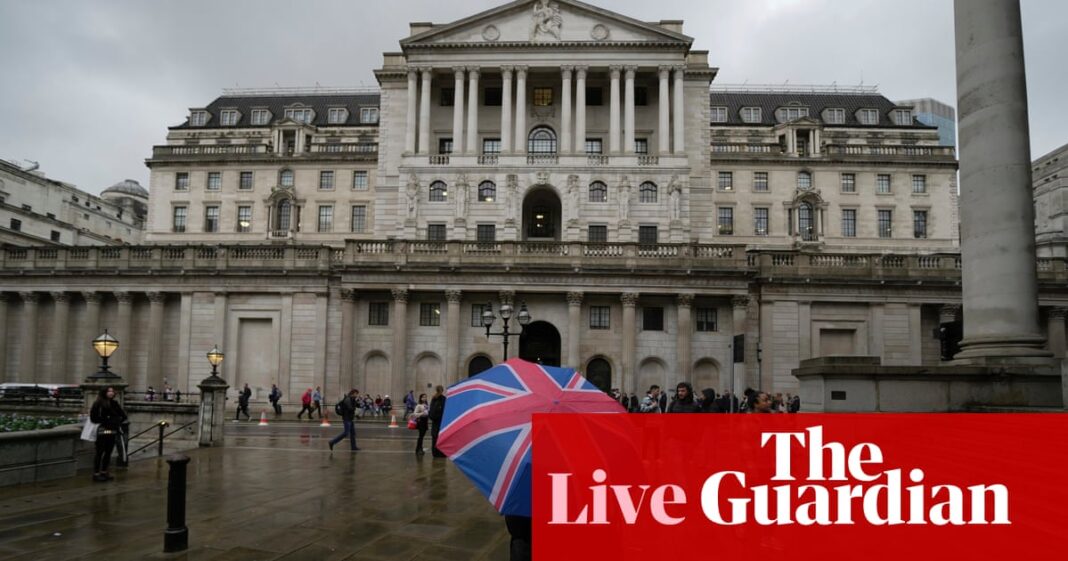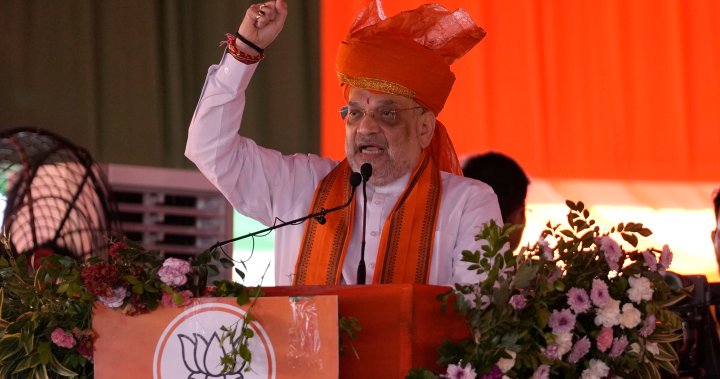Odds of November rate cut jump after inflation slides
A cut to UK interest rates next month is looking rather nailed on, after inflation tumbled below the Bank of England’s 2% target this morning.
The money markets are currently indicating that a quarter-point cut to Bank rate at the BoE’s next meeting in early November is a 91% chance. That’s up from just below 80% before the inflation report was released at 7am.
Such a cut would bring UK interest rates down from 5% to 4.75%.
Earlier this month, BoE governor Andrew Bailey told the Guardian that the Bank could become a “bit more aggressive” in cutting interest rates provided the news on inflation continued to be good.
Today’s drop in the CPI index to just 1.7%, from 2.2%, appears to meet the ‘good news’ yardstick.
Debapratim De, director of economic research at Deloitte, says:
“Price pressures continue to recede in the UK. Softening wage growth and services pricing point to further easing in the coming months.
“With inflation in retreat and UK growth slowing, the Bank of England will likely follow its August rate cut with another 25 basis point reduction in interest rates in November.”
Yesterday’s data showing a slowdown in wage growth could also encourage the Bank to hit the ‘cut button’ again.
Gora Suri, economist at PwC, agrees that the case for a November rate cut has strenthened:
Headline CPI inflation came in at 1.7% in September, dropping below the Bank of England’s target for the first time in three years, and adding to calls for another rate cut in November. This was mainly driven by downward contributions from motor fuels and air fares. Overall, this suggests we are very much at the end of the disinflationary process, which will be welcome news for policymakers and of course, consumers and businesses.
“Services inflation, the main area of concern, also fell considerably from 5.6% to 4.9%, and we are starting to see meaningful movement on wage growth, with annual growth in employee’s total earnings declining from 4.1% to 3.8%. All this is encouraging but upside risks to the headline rate remain, such as an increase in household energy prices and the potential for a spike in oil prices amid an escalation of conflict in the Middle East.
“The latest wage and inflation data is likely to further strengthen the case for a 25bp rate cut in November, especially considering the Bank’s increasingly dovish stance.”
Key events
Economist Julian Jessop suggests there’s a case for a large, half-point cut to UK interest rates next month:
IMHO, today’s UK #inflation data may be flattered by swings in transport costs, but they still add to the evidence that interest rates are much higher than they need to be.
A ¼% cut is surely nailed on for November.
Indeed, I’d vote for ½% – especially after a tight #Budget.
— Julian Jessop (@julianHjessop) October 16, 2024
Speaking of air fares….aircraft delivery delays at Boeing are having a knock-on impact on European airlines.
Ryanair will have to revise down its passenger traffic estimates for next year because of expected aircraft delivery delays from Boeing, according to the budget airline’s group CEO Michael O’Leary.
O’Leary told Reuters:
“We were supposed to get 20 deliveries before the end of December. They’ll probably come now in January and February, and that’s fine. We’ll have them in time for next summer.
“The big issue for Ryanair is we’re due 30 aircraft in March, April, May and June of next year, and how many of those will we get?”
“I think we’re clearly going to walk back our traffic growth for next year, because I don’t think we’re going to get all those 30 aircraft.”
Nomura: BoE may only be able to cut once per quarter
The Bank of England cannot declare ‘victory’ over inflation, even though it’s finally dropped below its 2% target, argues analysts at Japanese bank Nomura.
They suggest that the BoE may not take the drop in services inflation (from 5.6% to 4.9%) at face value, as much of the drop is due to cheaper air fares.
Nomura told clients:
Services inflation momentum slowed sharply in September and the BoE has now been surprised considerably to the downside versus its forecast in the August MPR (monetary policy report)
However, the weakness in services inflation was driven in large part by airfares, which are a component that the BoE often looks through.
The Bank of England will take comfort in today’s numbers, but still cannot claim victory over services inflation. Challenges remain, suggesting it can only cut once per quarter.
The money markets, though, are forecasting that UK interest rates fall to around 3.75% by next August, implying five cuts over the next 10 months.
UK house prices, and rents, are both rising faster than consumer price inflation, new data confirms.
New official data shows that average UK house prices increased by 2.8% to £293,000 in the 12 months to August, up from 1.8% in the 12 months to July 2024.
The ONS reports:
Average house prices increased in England to £310,000 (2.3%), in Wales to £223,000 (3.5%), and in Scotland to £200,000 (5.4%), in the 12 months to August 2024.
The summer market may have been slow but prices continued to heat up. Average UK house price annual inflation increased from 1.8% in July to 2.8% in August 2024, making the average UK house price £293,000, £8,000 higher than 12 months ago.
Annually, prices across the country… pic.twitter.com/glSKc9xKMZ— Emma Fildes (@emmafildes) October 16, 2024
Tenants continue to be hit with inflation-busting rental increases. Average UK private rents increased by 8.4% in the 12 months to September, the ONS says, adding:
Average rents increased to £1,336 (8.5%) in England, £760 (8.3%) in Wales, and £973 (7.2%) in Scotland, in the 12 months to September 2024.
In England, rents inflation was highest in London (9.8%) and lowest in the South West and Yorkshire and The Humber (6.3%), in the 12 months to September 2024.
London Underground workers to stage strikes in pay dispute
Britain’s inflation shock may be over, but the country’s period of industrial unrest is not!
London Underground workers, including drivers, are to stage a series of strikes next month in a dispute over pay.
Members of Aslef, working as Tube drivers, instructors, management grades, and those in the engineering section will walk out on different days in the first few weeks of November.
BREAKING NEWS: London Underground train drivers are set to strike next month in a dispute over pay, the Aslef union has announced.https://t.co/w9SjS5yQC4
— BBC London (@BBCLondonNews) October 16, 2024
Finn Brennan, Aslef’s full-time organiser on London Underground, said:
“We don’t want to go on strike – we don’t want to make travelling in and around the capital more difficult for passengers and we don’t want to lose a day’s pay – but we have been forced into this position because LU management won’t sit down properly and negotiate with us.
“Our members voted by over 98% in favour of strike action, but Underground management are still refusing to even discuss key elements of our claim.
“They refuse to discuss any reduction in the working week or introducing paid meal relief to bring Underground drivers in line with those on the Elizabeth line and London Overground.”
Aslef said a pay offer of 3.8%, plus a variable lump sum, means Underground drivers will stay on a lower salary than drivers on other Transport for London services while working longer hours.
David Muir, a senior economist at Moody’s Analytics, also suspects the Bank of England could cut interest rates in both November and December.
Following this morning’s drop in inflation to 1.7%, Muir says:
“With inflation easing by more than expected in September, and the pace of wage growth moderating further, recent data have cemented expectations of another cut in interest rates in November.
And it’s possible that the Bank of England could even lower rates at a slightly brisker pace than we currently expect, should the positive news around inflation be sustained. So, the chances of rates also being cut in December now look a bit higher.
That said, uncertainty around the economic outlook is high, and interest rate expectations will be sensitive to what the government announces in the Budget.”
UK interest rate cuts in both November and December are “now in place”, reports Simon French, chief economist at investment bank Panmure Liberum
Big downside misses to the BoE’s September inflation forecasts to both core inflation (4.9% vs 5.5%), and headline CPI (1.7% vs 2.1%). November and December now in play for back to back interest rate cuts. pic.twitter.com/9f6WZeMPny
— Simon French (@Frencheconomics) October 16, 2024
The money markets are indicating there’s a 78% chance that interest rates are cut to 4.5% by the end of this year (from 5% today), implying two quarter-point cuts at the Bank’s remaining two meetings (or one ‘jumbo’ half-point cut!).
Falling inflation means benefits increase will ‘barely touch the sides’ for poorer households
The Joseph Rowntree Foundation, which works on tackling poverty, is also concerned that September’s fall in inflation will mean a measly rise in benefits next April.
The JRF says a 1.7% increase would mean the standard allowance basic rate of universal credit (UC) would rise by around £1.50 a week from its current level of £90.55, while the basic rate for couples would go up by around £2.50 a week from the current level of £145.13 a week.
[As explained at 10.25am, September’s CPI rate is usually used to set benefits the following year]
The JRF’s Iain Porter explains:
“The consequence of today’s rate of inflation is that April’s uprating will be worth just a few pounds to most people.
“The reality is millions of families can’t afford enough food this week, or to turn the heating on as the nights get colder – emphasised by the fact that food price inflation has risen for the first time since early last year.
“The basic rate of universal credit is so insufficient it fails to protect families from hardship, and this increase will barely touch the sides.”
NIESR, the economic research institute, predict that September’s drop in inflation will be temporary.
They predict the CPI will pick up to 2.5% by the end of the year, partly because energy bills rose at the start of this month.
NIESR explains:
The upcoming 10% increase in the energy price cap in October will exert sizeable inflationary pressure, potentially raising the headline rate by an estimated 0.5 percentage points. We therefore expect inflation to rise to around 2.5 per cent by end of year due to base effects and the energy cap rise.
⚡️ OUT NOW ⚡️
Our latest CPI #Inflation Tracker expects inflation to rise to around 2.5 per cent by the end of the year 📈 due in part to the #energy price cap rise
Read more in our full analysis ⬇🔓https://t.co/QI2LwaMI0v
— National Institute of Economic and Social Research (@NIESRorg) October 16, 2024
Falling inflation bad news for households on benefits

Hilary Osborne
September’s fall in UK inflation looks likely to be bad timing for millions of people who receive state benefits linked to the figure, who could be set to see their payments rise by just 1.7% next April.
A number of benefits, including universal credit, are uprated each tax year in line with the cost-of-living figure for the previous September.
The fall in September, driven by falling air fares and transport costs, disguised increases in some categories, including food and drink, which recorded inflation of 1.9%.
The Resolution Foundation think tank said the 1.7% figure would mean that a typical low-income family with two children on universal credit would see their annual payment rise by £253 next April.
It said the fall in the headline figure was likely to be temporary as previous falls in energy prices dropped out of the 12-month inflation calculation, and suggested inflation could increase to 2.2% in October.
If the 2.2% figure was used, that same family would be £74 better off as the annual uplift would be £327.
State pensioners are protected by the triple lock and look set to see their payments rise in line with wages next year, meaning an increase of 4.1% next April.
This will add £473 a year to the full state pension.
Lalitha Try, economist at the Resolution Foundation, said:
“This temporary fall is badly timed for millions of low-to-middle income families as will result in a lower increase in their benefits next year.
“A more timely measure of benefit uprating would deliver a cash gain to a low-income family with kids of around £74 next year.
“The government needs to address the age divide in benefits which has left working-age support fall further behind rising wages and living standards.”
A cut in UK interest rates would be good news for borrowers but is likely to lead to a cut in savings rates.
The drop in the pound shows that today’s softer-than-expected inflation report raise the prospect of, in the words of Bank of England governor Andrew Bailey to The Guardian, some ‘more aggressive’ rate cuts.
So says Neil Wilson, analyst at Markets.com, who writes:
It’s left traders betting that not only is the Bank of England certain to cut rates next month but will also follow up with another in December. It also raises the chance, albeit slim, that the MPC goes for a jumbo cut in November in acknowledgement that they could and should have cut in September.
The OIS market now shows ~91% odds of a 25bps rate cut next month, up from around 80% before the inflation data. Beyond this, the markets now imply rate cuts at five of the next six BoE meetings through to the middle of next year.
Wilson also imagines an alternative universe where Rishi Sunak had delayed the election to the last minute, rather than going to the country in July. Could low inflation have been enough to save the Tory party from defeat?
Or perhaps not. He adds:
Of course there was a LOT more to the Tory defeat than just inflation. Anyway, we are where we are. And this morning UK stocks are rallying sharply and sterling sliding on much weaker inflation data.
UK narrows gap with German borrowing costs
The gap between UK and German borrowing costs has narrowed today.
The yield (or interest rate) on 10-year UK gilts is now 189 basis points higher than the equivalent for bunds. That’s the smallest gap since 4th October.
The yield on 10-year gilts has dropped below 4.1% today (see earlier post) to 4.085%, while German 10-year bund yields dropped by less, to 2.194%.
Back on the 8th October, the Financial Times caused a stir by reporting that investor concerns about the Labour government’s Budget had pushed the gap with Germany to the widest in more than a year.
However, there were other factors in play. For starters, uncertainty over how quickly the Bank of England might cut interest rates (which has been somewhat resolved today). Secondly, UK borrowing costs was tracking those of the US, which have been pushed up by stronger data from the American economy.
Thirdly, Germany appears to be sliding into recession again – countries with low growth tend to have low bond yields.
Fourthly, expectations of cuts to eurozone interest rates by the European Central Bank have been rising.
As bond market expert Toby Nangle wrote in the FT this week, bond investors are “frenemies at best to a pro-growth chancellor”, so Reeves should not try to appease them in the budget by squeezing borrowing for investment.
Nangle says:
The greatest risk to long-term fiscal sustainability is low growth. And so the greatest compliment the bond market can give a chancellor aiming for economic rejuvenation is a mild sell-off.


